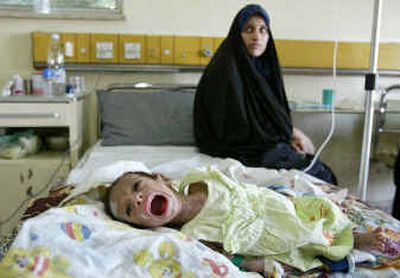Hospital can offer little as Iraqi children die

BAGHDAD, Iraq – Three-month-old Ali twists his emaciated body and cries – but barely a sound comes out of his mouth. He’s so sick from diarrhea and dehydration that his mother fears he won’t make it. Doctors aren’t sure either.
At Baghdad’s General Teaching Hospital for Children, children die each week from diarrhea because of poor sanitation, shortages of medical equipment and poorly trained staff. Diarrhea is common in the hot summer.
Even though improved medical care is a stated priority of U.S. occupation authorities, medicine is still costly and in short supply. Often, parents must buy medicine on the open market at prices many cannot afford.
Three-year-old Hussein Ibrahim al-Shammar and 4-month-old Abdullah Saad al-Jbouri were admitted with chest infections, but developed diarrhea in the hospital.
Cockroaches roam hospital wards and pools of urine in the corridors are not unusual. There is an overpowering stench from toilets that overflow into the wards; sewage sometimes runs through the corridors.
“He got sicker in hospital,” Abdullah’s mother Zahra al-Obeidi, 20, said Friday. She now brings her own sheets and buys his medication.
Hussein’s grandfather, Ali Hassoun al-Hayali, a policeman, holds a small oxygen tube on the toddler’s mouth because the hospital is so short-staffed that families often do the nursing. Doctors say many nurses do not have adequate training and cannot be trusted with simple tasks.
Baby Ali opens his eyes, but they instantly shut again. His skin hangs from his bones. His eyes are too big for his face; his knees and long feet are too big for the stick-like legs that poke from under his diaper. His mother has placed a small Quran near his head.
Dr. Zainab Faik said Ali’s case is complicated – he suffers from diarrhea, fever and a swollen abdomen. He has been given everything the hospital has to offer – antibiotics, blood plasma, IV fluid and a nasal gastric tube.
“His condition is grave,” she said. “It hasn’t improved since he was brought here” on May 15. “He can’t take food, he can’t even suck on food,” she said.
The doctor said his chances of survival aren’t good. “He doesn’t have immunity against bacteria, his weight is low.” Ali weighs only 6.6 pounds.
Would Ali die if he were in a hospital in Europe?
“No,” Faik said firmly.
Dr. Rana Mohammed agreed. “If he were in a European hospital they would conduct a good investigation. Here, there’s an overload on our laboratory.”
The lab lacks essential supplies. While it has blood gas analysis equipment, the staff doesn’t know how to use it. “We don’t have new generation antibiotics” – they cost too much, Mohammed said. “We only have old antibiotics.”
Many international aid groups have cut back on foreign staff in Iraq and curtailed their operations because of deteriorating security in the country.
The doctors said U.S. Army medical teams and various humanitarian groups have come to the hospital in recent months and made lists of the medicine and supplies that are needed. But nothing has arrived.
About four months ago, the U.S. military brought several Iraqi workers to the hospital who cleaned and painted the walls and did some superficial repairs to the wards.
“Painting the walls is not so important. We need drugs,” Faik said.
The sewage system has largely collapsed at the 160-bed hospital and is working at only 10 to 20 percent capacity. The hospital also lacks air conditioning, and fans provide little relief from the 113-degree heat.
“When you are dehydrated, the heat will aggravate the condition,” Mohammed said.
“One to two children die per week because of diarrhea,” Faik added.
Ali’s mother, Rahab al-Musawi, said the family does not have the money to take him outside Iraq for treatment.
She said she has to buy the needles for his intravenous fluid, at a cost of $1.40 each. Since Ali was admitted, she has bought nine needles. She also buys his U.S.-made lactose-free formula for $4.80 a bottle.
“I am afraid,” she said, struggling to hold back tears. “I am afraid he will die. . . . He’s losing more and more weight every day.”